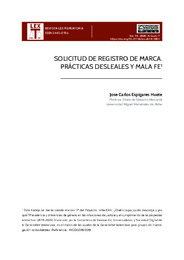Por favor, use este identificador para citar o enlazar este ítem:
https://hdl.handle.net/11000/26660Registro completo de metadatos
| Campo DC | Valor | Lengua/Idioma |
|---|---|---|
| dc.contributor.author | Espigares Huete, José Carlos | - |
| dc.date.accessioned | 2022-04-28T08:10:02Z | - |
| dc.date.available | 2022-04-28T08:10:02Z | - |
| dc.date.created | 2020-09-27 | - |
| dc.identifier.citation | nº14 (2020) | es_ES |
| dc.identifier.issn | 2445-0936 | - |
| dc.identifier.uri | http://hdl.handle.net/11000/26660 | - |
| dc.description.abstract | La STJCE de 11 de junio de 2009, asunto Lindt, no vincula necesariamen-te la mala fe del solicitante de la marca a la utilización por un tercero de un signo idéntico o similar para un producto o servicio idéntico o similar que pudiera dar lugar a confusión con el signo cuyo registro se solicita. Tal posicionamiento, así entendido, supondría una interpretación restricti-va de la mala fe en la solicitud del registro de marca que ahora el TJUE ha rechazado explícitamente. El binomio representado por la STJUE de 12 de septiembre de 2019 (asunto c-104/18 P) y la STJUE de 29 enero de 2020 (asunto c-371/2018) aproximan la delimitación del concepto de la mala fe en la solicitud de marca, a nuestro juicio, a una concepción más vinculada a la funcionalidad de la marca y a la garantía de una leal participación en el proceso competitivo (suponga o no ese registro una colisión directa con un signo de un tercero). Pero la interpretación no rígida (no restrictiva) de la mala fe que sugiere el TJUE, y aunque no debiese ser así, corre el riesgo de alterar las reglas de una competencia leal en su aplicación al caso concreto | es_ES |
| dc.description.abstract | The STJCE of June 11, 2009, Lindt case, seemed to link the bad faith of the trademark applicant to the use by a third party of an identical or similar sign for an identical or similar product or service that could lead to confusion with the sign whose registration is requested. Such a position, unders-tood in this way, would imply a restrictive interpretation of bad faith in the application for trademark registration, which the TJEU has now explicitly rejected. The binomial represented by the STJUE of September 12, 2019 (case c-104/18 P) and the STJUE of January 29, 2020 (case c-371/2018) approximate the delimitation of the concept of bad faith in the application for a trademark, in our opinion, to a concept more linked to the functionality of the trademark and the guarantee of fair participation in the competitive process (whether or not this registration is a direct collision with a sign from a third party).But the non-rigid (non-restrictive) interpretation of bad faith suggested by the TJEU, and although it should not be so / that way, runs the risk of altering the rules of fair competition in their application to the specific case.Keywords: Bad faith, trademark applicant, fair competition. | es_ES |
| dc.format | application/pdf | es_ES |
| dc.format.extent | 13 | es_ES |
| dc.language.iso | spa | es_ES |
| dc.publisher | Universidad Miguel Hernández de Elche | es_ES |
| dc.rights | info:eu-repo/semantics/openAccess | es_ES |
| dc.rights | Attribution-NonCommercial-NoDerivatives 4.0 Internacional | * |
| dc.rights.uri | http://creativecommons.org/licenses/by-nc-nd/4.0/ | * |
| dc.subject | Marca, solicitud de registro | es_ES |
| dc.subject | solicitud de registro | es_ES |
| dc.subject | mala fe | es_ES |
| dc.subject | prácticas desleales | es_ES |
| dc.subject | nulidad | es_ES |
| dc.subject.other | 34 - Derecho::340 - Cuestiones generales de derecho. Métodos y ciencias auxiliares del derecho | es_ES |
| dc.title | Solicitud de registro de marca. Prácticas desleales y mala fe | es_ES |
| dc.type | info:eu-repo/semantics/article | es_ES |

Ver/Abrir:
925-Texto del artículo-4112-1-10-20200927.pdf
258,31 kB
Adobe PDF
Compartir:
 La licencia se describe como: Atribución-NonComercial-NoDerivada 4.0 Internacional.
La licencia se describe como: Atribución-NonComercial-NoDerivada 4.0 Internacional.
.png)